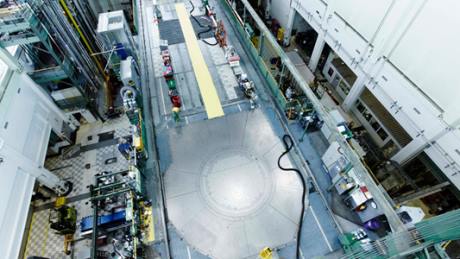Canada's NRU reactor will be able to continue to play a key role in providing medical isotopes until March 2018 after the Canadian government announced its decision to support an extension of the reactor's operations. The extension will be subject to regulatory approval.
 |
| NRU (Image: CNL) |
The Canadian government's decision to support NRU's operation until 31 March 2018 was announced by Minister of Natural Resources Greg Rickford. NRU - its full name is the National Research Universal reactor - began operations at the Chalk River site in 1957, and had been scheduled to close down on 31 October 2016. The life extension is subject to relicensing by the Canadian Nuclear Safety Commission (CNSC).
NRU supplies around 40% of world supply of molybdenum-99 (Mo-99), which is used as a precursor for the technetium-99m (Tc-99m) employed in around 80% of all nuclear medical procedures. The radioisotopes are short-lived and cannot be stockpiled, and the supply chain has shown its vulnerability to interruptions from unplanned outages at the producing reactors in recent years. These have included unexpected shutdowns at NRU, which the Canadian government says have resulted in significant costs to taxpayers.
Since its 2000 announcement that it would cease routine production of Mo-99 at NRU in 2016, the Canadian government has promoted a strategy to develop alternative sources of supply for the vital medical radioisotope in which it has invested some $60 million. A project to build two 10 MWth MAPLE research reactors at Chalk River, which would have been able to replace most of the radioisotope production from NRU, was abandoned in 2008.
NRU was built not only to supply radioisotopes but also as a major neutron physics research facility and to provide engineering research and development support for Canada's nuclear power program. The reactor operates at power levels up to 135 MWt and has an annual capacity factor of around 80%.
Canadian Nuclear Laboratories (CNL) expects to continue operating NRU until March 2018, when the reactor will be placed into a "state of storage" prior to decommissioning. CEO Bob Walker said that CNL would continue to ensure the reactor works safely and reliably over the next three years. As well as its radioisotope production role, NRU supports CNL's three Centres of Excellence, and Walker said that the science and technology organization would be working with its customers to get the most out of the reactor in its remaining years, accelerating research and irradiation campaigns.
Paying tribute to the venerable reactor, Walker said it had provided a research facility for Nobel prize-winning scientific advances as well as laying the foundation for Canada's nuclear industry. "By the time of the shutdown in 2018, the NRU will have served Canada for six decades. We are all proud of this incredible legacy," he said.
Researched and written
by World Nuclear News






_55401.png)
_23009.jpg)






